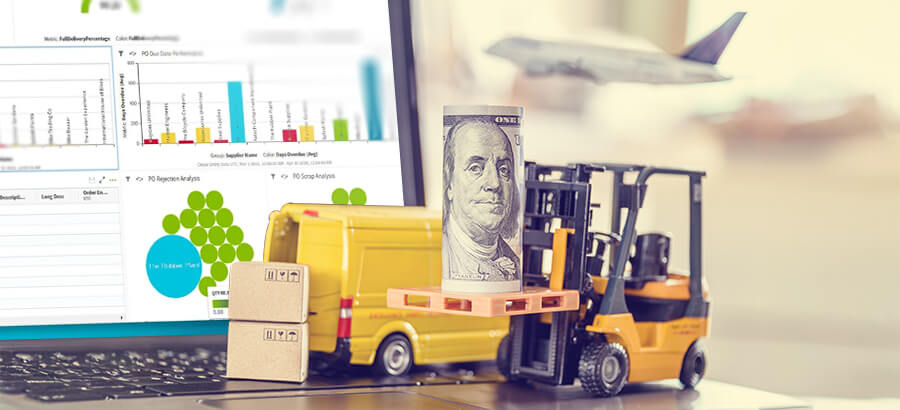Many manufacturers struggle to optimize warehouse productivity and attract skilled employees. Inefficient working conditions and manual work only worsen the problem. In fact, the latest figures from the Bureau of Labor Statistics in the U.S. put annual warehouse turnover rates at 43 percent.
That’s where automation comes into play. An ERP system that incorporates a cutting-edge warehouse management system (WMS) can help you optimize processes, streamline workflows and decrease errors. The benefits include happy customers (due to on-time deliveries); increased employee satisfaction (because automated processes are less labor-intensive); and an overall boost to business profitability (less time spent on manual tasks).
Here are four simple manufacturing warehouse tips to help you run your warehouse more efficiently:
Quick Win #1: Assess and reorganize your warehouse
One of our customers managed to increase usable pallet floor space by 33 percent simply by rearranging their warehouse over a single weekend. As an added benefit, effective warehouse organization ensures pickers spend less time searching for items and make fewer mistakes. Here’s how to do it:
- Label aisles, rows and bins with floor or overhead placards so employees can identify the correct location quickly and easily. Using alphanumeric logic can help you optimize simple picking strategies without having to implement a full-blown warehouse solution or warehouse mapping solution.
- Separate raw materials and finished goods. During Covid-related supply chain disruptions, many manufacturers ran out of warehouse space and began stashing inventory wherever there was room. But misplaced inventory can slow or even halt production and delay shipments to customers.
- Use space-saving containers or shelving. For example, by stacking containers higher you can make use of vertical space, and mobile shelving units can be useful for seasonal products.
- Establish a layout based on order picking. Basic rules of thumb: groupings should be logical; fast moving inventory should be easily accessible and quickly replenished; and products frequently purchased together should be located near each other in your warehouse.
Quick Win #2: Improve order picking speed and accuracy
Order picking is one of the most labor-intensive and expensive activities in the warehouse and by harnessing the information provided by your ERP you can increase its speed and accuracy. Read on for a couple of techniques to help operators pick more efficiently:
- Pick by bin location. You don’t even necessarily need a warehouse management solution (WMS) to take advantage of this time-saving technique. When printing your packing slips, simply sort by bin location. Sales orders will appear in a logical flow for picking.
- Group multiple orders. By consolidating multiple orders into a single pick list for your operators, you reduce travel time and eliminate errors.
- Take advantage of suggested picks. With an effective WMS, even manufacturers who don’t allocate bins or lots ahead of time can access suggested picks. This can be particularly helpful for, say, food manufacturers who are tightly managing inventory based on FIFA (First In First Out) or FEFO (First Expire First Out) practices.
Quick Win #3: Speed up barcode scanning
Barcode scanners are a crucial component of automating data collection, saving time and reducing errors in your warehouse. Yet many manufacturers regard replacing them as an unnecessary expense.
I’m reminded of one of our customers, who had been using the same old Windows mobile devices in his warehouse forever. The problem: due to software and hardware limitations, he couldn’t take advantage of time-saving features such as lot suggestions or picking suggestion. And it took an entire weekend to update the devices and make sure they were operating properly.
Also, their scanning distance, speed and accuracy were much lower than newer devices. For example, the old handhelds took 20 to 60 seconds to load a list of lots. When we tested the same workflow on new Android devices, they loaded in a second or two.
That doesn’t sound like much, but if a picker is picking 20 to 50 lines a day, multiplied by 20 pickers across two shifts, that wasted time starts to add up. At the end of the day, investing in updated equipment enables you to take advantage of time-saving features and makes it easier for the operators to do their job.
Quick win #4: Improve inventory management with pallet tracking (or master license plating)
Particularly in a low volume, high SKU warehouse, picking can feel like a scavenger hunt, because operators are not picking the same items over and over and items are often stored in random locations. Pallet tracking gives you a way to group and manage inventory items.
You’ll need to attach a barcode label, RFID tag and/or IoT sensors to your pallets. Your ERP software then provides real-time information about the pallet’s location (what items are on the pallet, where it is now, where it was earlier and how many times and where it was moved), as well as its status (whether it is in inventory or has been issued to a job, etc.).
Benefits include:
- Pickers spend less time searching for pallets.
- They can manage or move items by common container or pallet with one scan.
- They can stage items for sales orders or jobs.
- You can set up your system to match how your operators physically work.
- You know immediately when a pallet is removed (a powerful tool for preventing theft).
Here are a few more tips to help you scan quicker:
- Reduce scans with 2D barcodes (license plates). 2D barcodes give you access to multiple pieces of information in one barcode (i.e. stock code, lot number and quantity). By making use of this simple improvement, you can most likely reduce the number of scans needed to perform a transaction by more than 50 percent.
- Standardize labels. With a well-labeled warehouse, you can maximize use of IT technologies that enhance efficiency.
- Automate label printing. A labeling system prints the appropriate dispatch information on the label and applies it to the correct product automatically, so you can process orders faster and more reliably.
To learn more about how you can modernize and improve your warehouse operations, check out this webinar.






